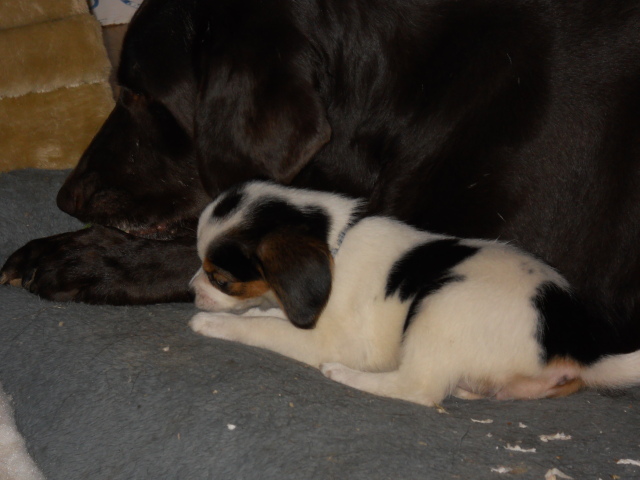Questioni have a 12 year old beagle, he has always been a happy, healthy little guy. just last night we noticed he was having problems standing and walking. at first we thought he was stung or hurt his paw. but now he is having problems with his other front leg. could it be an ear infection? he is eating and drinking, other than problems standing, he seems ok. this came on all of a sudden. any ideas what it could be?
AnswerHello Cindy!,
As long as he IS eating and drinking as he has always been then I don't think its that obviously. Balance isn't really effected by a ear infection unless it has gotten serious, some signs you can check for a ear infection are: Discharge in the ears (often black and chunky, or yellow and pasty), Distinct pungent or chalky odor, Excessive scratching or rubbing of the ears, Redness or swelling in the inner flap and canal, Shaking or tilting head to the side, Pain to the touch of the ears, Irritable behavior. As Beagles grow older, it is undeniably true that the health deteriorates too. Whether they are well-taken cared of or not, there is always a risk of developing diseases as dogs age. But sometimes, disease that usually affects older dogs can also be seen in young ones. One of these diseases is the canine arthritis.The dog's skeletal system is as important as the human's skeletal system. It promotes normal condition among dogs by providing the body with framework, protecting the internal organs and in providing a full range of motion. The system is composed of bones, cartilage and ligaments. In order for the dog to continue its normal activities, these bones and joints should not be damaged. Canine arthritis occurs when there is an inflammation in the joints of a dog. Dogs of all sizes, breeds and ages can develop arthritis though older dogs are more prone to this disease. Canine arthritis is categorized into two; degenerative joint disease and inflammatory joint disease. Degenerative joint disease is also called osteoarthritis. This happens when the cartilage that protects the bones that make up the joint is damaged. Damage in the cartilage is caused either by normal stress on abnormal joints or abnormal stress on normal joints. Degenerative joint disease is further subdivided into two; primary and secondary. There is no known cause for primary degenerative disease while secondary disease can be the result of hip dysplasia, patella luxation (loose kneecap), osteochondritis dissecans, trauma and ruptured cruciate (knee) ligaments. Inflammatory joint disease is another type of canine arthritis. This type can be caused by either infection or immune0mediated diseases. It usually affects multiple joints and is accompanied by fever, anorexia and all-over stiffness. Inflammatory joint disease is further subdivided into two; infectious and immune-mediated diseases. Infectious disease can be caused be bacteria while immune-mediated disease is caused by weakness in the immune system. Hereditary can also be the cause of this type of arthritis. Reluctance to walk, climb stairs, jump or play are signs of arthritis in Beagles. Gradual limping and swelling around a joint can also be seen. Your dog will also show tenderness when flexing a joint and may hold its breath or stop panting when an affected joint is moved or used. Decrease in appetite is also present in canine arthritis. Severe arthritis can be treated usually through surgery. But there are some cases when surgery is not needed anymore. Non-surgical treatment of arthritis includes painkillers, exercise, rest and diet. Dog owners should carefully read the product label of dog foods to check its content. But the amount of food and frequency of feeding should be regulated as well to prevent obesity. Exercise is another step to prevent obesity in dogs. But Beagles with arthritis should only have limited and gentle exercise. They should also be restricted from doing strenuous activities. I know this can be a lot, but arthritis is something to look for in this case. I would look furthur into it with your VET. I hope this has helped if you need anymore help please don't hesitate to ask. Best Wishes!

 beagle house training
Question
Panda with my chocolat
I apologize in advance
beagle house training
Question
Panda with my chocolat
I apologize in advance
 beagle puppy
QuestionQUESTION: dear, i just have a beagle pup, he is
beagle puppy
QuestionQUESTION: dear, i just have a beagle pup, he is
 what type of beagles is he , like is he mix with what
Question
beagle
Im getting this dog, well hopefu
what type of beagles is he , like is he mix with what
Question
beagle
Im getting this dog, well hopefu
 Job vs Beagle baby :(
Question
Bender baby
Hi!!!
My boyfriend and I just saw
Job vs Beagle baby :(
Question
Bender baby
Hi!!!
My boyfriend and I just saw
 Beagle pup - flea/tick preventative
Question
Me & Lilly at Puppy Sc
I have an 8 month o
Beagle pup - flea/tick preventative
Question
Me & Lilly at Puppy Sc
I have an 8 month o